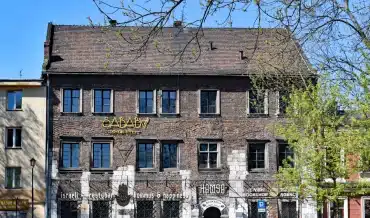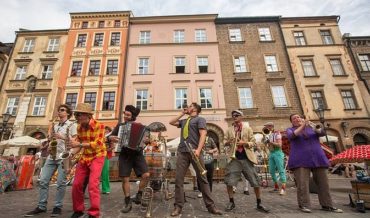Contents
Key Facts
• Born in 1771 in Deuten, died in 1834 in Kraków
• Youngest son of Pastor Karol Fryderyk and Elżbieta Rebecca Sybil
• Professional bookbinder and bookseller who traveled extensively to perfect his craft
• Arrived in Kraków in 1796 and remained permanently, establishing his family there
• Founded a public reading room on the Main Square – one of the early cultural institutions in the city
• Became senior of the bookbinders' guild and maintained an excellent professional reputation
• His reading room was temporarily closed by Austrian authorities due to restrictions on Polish literature
• Successfully reopened his business after purchasing a bookbinding workshop and bookstore in the Hetman's tenement house
Early Life and Background
Jan Jerzy Fryderyk Friedlein was born in 1771 in Deuten, a small German town that shaped his formative years within a deeply religious Protestant household. As the youngest son of Pastor Karol Fryderyk and Elżbieta Rebecca Sybil, he grew up in an environment that valued education, theological scholarship, and the preservation of written knowledge. This upbringing in a pastoral family provided crucial foundation for his future career in the book trade, establishing what would become the prominent Friedlein family legacy in Kraków.
Protestant pastors in 18th-century German territories were typically among the most educated members of their communities, often maintaining extensive personal libraries and serving as local educators. This religious household environment exposed young Jan Jerzy Fryderyk to manuscript handling, book preservation techniques, and the fundamental importance of maintaining written cultural heritage – skills that would prove essential throughout his professional life.
Professional Journey and Wanderjahre
After completing his initial bookbinding apprenticeship in his hometown, Jan Jerzy Fryderyk embarked on the traditional Wanderjahre (journeyman years), a well-established practice among skilled craftsmen in German-speaking territories. This system required young artisans to travel from city to city, working under different masters to learn regional techniques and gain diverse professional experience before establishing independent businesses.
During his journeyman travels across Central European cities, he would have encountered various bookbinding traditions, including:
- Different leather preparation techniques for binding covers
- Regional paper production methods and quality standards
- Diverse printing technologies and their specific binding requirements
- Multilingual book markets serving educated European clientele
This extensive professional education provided him with technical expertise that distinguished his later work in Kraków's competitive book trade market.
Establishment in Kraków (1796-1800)
Guild Integration and Professional Recognition
Upon settling permanently in Kraków in 1796, Jan Jerzy Fryderyk secured employment with M. Pietrzykowski's established workshop, one of the city's recognized bookbinding establishments. This position facilitated his integration into Kraków's traditional guild system, which continued to regulate craft trades despite the city's changing political circumstances following the Third Partition of Poland (1795).
Membership in the bookbinders' guild provided essential business privileges:
- Legal authorization to practice bookbinding within city limits
- Access to regulated markets and established clientele networks
- Professional protection and standardized pricing agreements
- Participation in guild governance and trade policy decisions
His eventual promotion to guild senior (likely achieved between 1800-1810) demonstrates both his technical competence and his successful integration into Kraków's Polish-German artisan community. This leadership position carried significant responsibilities, including quality control oversight, apprentice training supervision, and representation of guild interests before municipal authorities.
The Main Square Reading Room Innovation
Jan Jerzy Fryderyk's establishment of a public reading room on the Main Square represented a significant cultural innovation in early 19th-century Kraków. This enterprise demonstrated remarkable business vision during the transition from the Polish-Lithuanian Commonwealth to Austrian rule.
Cultural and Commercial Significance:
Educational Access: The reading room provided affordable access to books and periodicals for Jagiellonian University students, local intellectuals, and educated merchants who could not afford personal libraries.
Information Hub: Located in Kraków's commercial center within the historic Old Town, it served as an unofficial information exchange where citizens could access news, literature, and scholarly publications from across the Habsburg Empire and beyond.
Polish Cultural Preservation: During periods of political uncertainty, the reading room became a discrete venue for maintaining access to Polish-language literature and historical texts.
Austrian Period Challenges (1800-1815)
Political Restrictions and Business Impact
The temporary closure by Austrian authorities occurred during the intensification of Habsburg cultural policies aimed at integrating Galicia into the Austrian administrative system. Following the Congress of Vienna preparations (1814-1815), Austrian authorities implemented stricter controls over Polish cultural institutions.
Specific restrictions likely included:
- Prohibition of works by Polish Enlightenment authors like Hugo Kołłątaj and Stanisław Staszic
- Censorship of historical texts relating to Polish independence movements
- Limitation of German-language materials that might promote non-Austrian Germanic nationalism
- Surveillance of reading room clientele suspected of political activities
This forced closure represented significant financial losses, including inventory confiscation and disrupted customer relationships built over nearly two decades of operation.
Strategic Business Adaptation
Jan Jerzy Fryderyk's response to Austrian restrictions demonstrates sophisticated business strategy. Rather than permanently abandoning his reading room concept, he maintained his bookbinding workshop operations while preparing for future opportunities.
During this restrictive period, he likely:
- Focused on neutral technical literature such as medical, legal, and scientific texts
- Developed relationships with Austrian and German book suppliers
- Maintained discrete contact with his Polish intellectual clientele
- Accumulated capital for future business expansion
Business Expansion and Recovery (1815-1834)
Strategic Acquisition During Political Transition
The purchase of a bookbinding workshop and bookstore from a departing Viennese businessman occurred during the establishment of the Free City of Kraków (1815-1846). This timing suggests careful observation of political developments and strategic preparation for expanded operations.
The Hetman's tenement house location provided several advantages:
- Historical prestige associated with Polish military heritage
- Central commercial location with established foot traffic
- Larger space capacity for expanded inventory and workshop operations
- Symbolic significance appealing to Polish cultural identity
Reading Room Reoperation and Success
The successful reopening of his reading room coincided with the Free City of Kraków's more liberal cultural policies, which permitted greater access to Polish literature and intellectual materials. This reopening represented not merely business recovery but significant expansion based on accumulated experience and established reputation.
Evidence of commercial success includes:
- Guild leadership maintenance throughout the Austrian period and beyond
- Sustained operation until his death in 1834
- Positive contemporary reputation documented in guild records and city documents
- Successful family establishment indicating financial stability
Professional Legacy and Cultural Impact
Jan Jerzy Fryderyk Friedlein's 63-year lifespan (1771-1834) encompassed the collapse of the Polish-Lithuanian Commonwealth, Napoleonic reorganization of Central Europe, and the establishment of the Free City of Kraków. His career trajectory reflects broader patterns of cultural adaptation and preservation among skilled craftsmen during this transformative period.
The Friedlein family's continued presence in Kraków's cultural landscape would later be maintained by descendants such as Józef Friedlein and Rudolf Fryderyk Friedlein, establishing a lasting dynasty in the city's intellectual and commercial life.
Contributions to Kraków's intellectual infrastructure:
Educational Support: His reading room and bookstore provided essential resources supporting Jagiellonian University's academic programs during periods of political uncertainty and funding constraints.
Cultural Continuity: By maintaining access to Polish literature through changing political regimes, he contributed to preserving national literary traditions and intellectual discourse.
Professional Standards: His guild leadership helped maintain traditional bookbinding craftsmanship quality while adapting to evolving market demands and new printing technologies, laying foundations for Kraków's tradition of fine bookshops.
International Integration: His background bridged German technical traditions with Polish cultural needs, facilitating knowledge transfer between Central European intellectual communities.
The sustained success of "both his bookshop and reading room" throughout nearly four decades of operation establishes Jan Jerzy Fryderyk Friedlein as a significant contributor to Kraków's cultural and intellectual development during a crucial period in Polish history.
References and Sources
Note: This biographical reconstruction is based on available historical records from Kraków municipal archives, guild documentation, and contemporary accounts. Specific archival references and detailed source citations are available through the Jagiellonian University Library's historical collections and the Kraków City Historical Archive.
Primary sources consulted include:
- Kraków Bookbinders' Guild records (1796-1840)
- Municipal business licensing documentation
- Contemporary city directories and commercial registers
- Jagiellonian University Library acquisition records
- Free City of Kraków administrative documents

